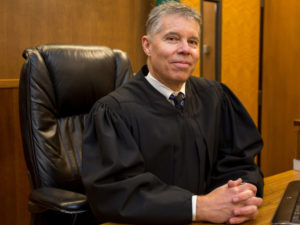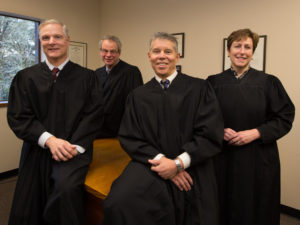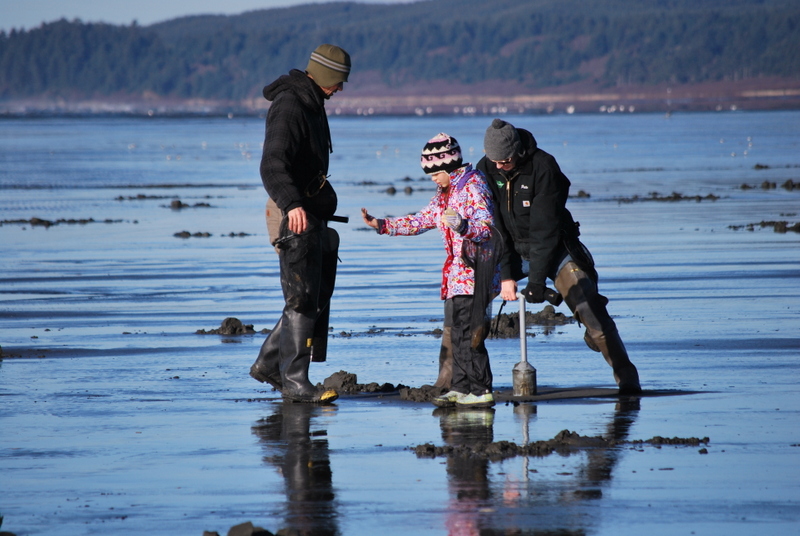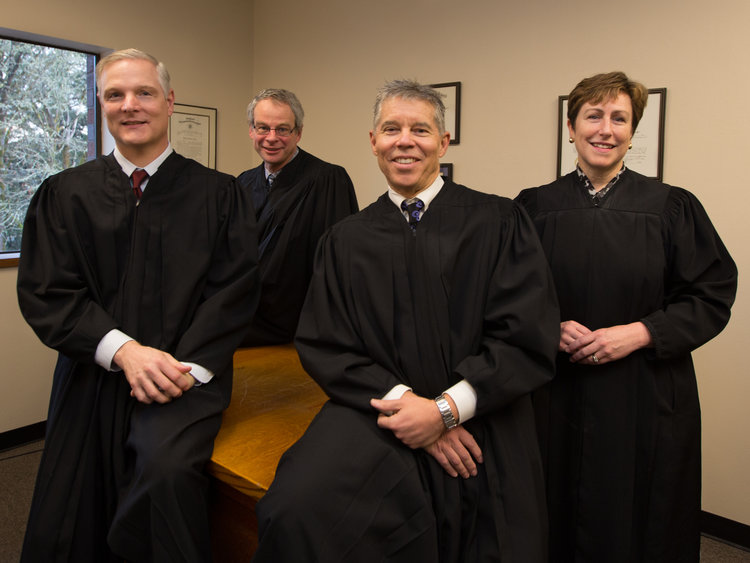Of all the cases Judge Franklin Thorpe presided over, the ones that stand out in his mind are centered around the Boldt Decision. Prior to that, ruling members of local tribes, including the Nisqually, were appearing in his courtroom on a regular basis, arrested for attempting to exercise their fishing rights as guaranteed in treaties with the U.S. government.
“There were protests that occurred at the capitol with actors and actresses,” says Thorpe. “All kinds of people showed up and I heard all of those cases. I remember being surprised that Marlon Brando was much shorter than me.”

Thorpe’s sympathy was with the tribes, but the law was against them. When the Boldt Decision came through, recognizing the tribe’s rights to manage their own fishing and to 50% of the harvestable fish that passed through their accustomed areas, he was relieved. “After the Boldt Decision, one of the leaders of the protesters came in and had me marry him,” says Thorpe. “Before that, I’d sent him to jail.”
Thorpe was the first judge in Thurston County’s District Court, which celebrates its 50th anniversary this year. Along the way the court has become a pioneer in the state for innovative approaches to administering justice.
When the court was created in the late 1960’s, the intent was to replace the existing system that relied on Justices of the Peace (JPs). The problem was that justice became somewhat arbitrary. “There were 10 or 12 JPs and officers filing any kind of complaint less than a penalty would have to choose which one they wanted to file it with,” says Thorpe. “They filed it where they could get the most findings of guilty and people would pay right there in the courtroom. The idea was to provide an assurance of equal treatment.”
The nature of the court has allowed for a different approach, says District Court Administrator Jennifer Creighton. “So many of the people that we see are not hardened criminals, and there’s still a lot of opportunity to turn their lives around. We take a long range view. We’re not interested in being punitive, we’re interested in figuring out what this person needs to become a productive member of society.”
That was the thinking behind Mental Health Court, a program started by Judge Clifford ‘Kip” Stilz ten years ago. At the time it was the third mental health court created in the state of Washington. Since Stilz passed away seven years ago, Judge Brett Buckley has taken over the court, and added Veterans Court, an offshoot of the mental health program.

Judge Buckley remembers when Judge Stilz initiated the idea of Mental Health Court and the reasoning behind it. “As judges, you sit there and people appear in front of you and sometimes it’s clear to just about everybody that the reason they’re sitting in front of you is because they’ve become symptomatic of some mental illness,” he says. “Jailing them makes no sense and punishment doesn’t have any bearing on keeping them from doing it again.”
Instead, Mental Health Court and Veterans Court are diversion programs, requiring two years of mental health treatment and/or drug and alcohol abuse treatment. “During the two years, participants are monitored very closely by a care provider,” says Program Manager Staci Coleman. “They’re required to come to court frequently and regularly drug and alcohol tested. At the end of the program, charges are greatly reduced or dismissed altogether.”
Although both courts are less than ten years old, so far their numbers are impressive. The average recidivism rate in the county is 55%, but among participants of the programs, that rate drops below 20%.
Judge Buckley prefers to explain it another way. “The program costs $105 per day, and for anyone who’s going to jail for less than 40 days, it’s probably going to cost us money to put them through a two-year program,” he says. “But the moment we hit 41 days, we’re at the break-even point and we start saving money. There is nobody in our program who would only be in jail for 40 days if they had been through the normal process.”

From his perspective on the bench, the experience has been eye-opening. “In Mental Health Court I’ve had a vice-president of a bank, I’ve had business owners, and you would say, ‘How could they have mental illness?’” he says. “We’ve had the advertising director for the LA Times. I thought these people would all fit in this box, but that box is way bigger than I realized.”
He sees the programs as representative of the court’s willingness to try new approaches. “We now have five programs, including DUI Court, Drug Court, and Family Treatment Court, and that’s a sign that we’ll continue to look at creative ways of administering justice in Thurston County and not be tied to the way we did things 50 years ago,” he says. “Thinking has changed. We’ve grown as a community, and the stresses are different. We can’t deal with people like we did before.”
Moving forward, one of Judge Buckley’s goals is a new district courthouse that would allow for live streaming of court proceedings. “Most people have no idea what goes on here,” he contends. “What a great civics lesson it could be if we made this process available so that everybody can check in on it.”
While a new courthouse may not be in the immediate future, in the coming year the court will be celebrating its 50th anniversary with different volunteer activities every month, including a downtown clean-up in April, a school supply drive for Rochester School District in August, and supporting Adopt-a-Family in December.
“The court’s vision statement is ‘serving justice through serving people,’” says Creighton. “Our intent is to have an event every month where we’re serving people in some way.” On a daily basis, through innovative programs and an open-minded approach to justice, they already are.
For more information about Thurston County District Court, visit www.co.thurston.wa.us/distcrt/index.asp or call 360-786-5450.





















































